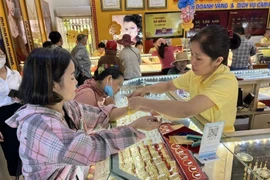HCM City (VNS/VNA) - Vietnam is strengthening its regulatory framework and policies to promote cashless payments as part of its broader strategy to develop a more digital economy.
Speaking at a seminar in Ho Chi Minh City on June 14, Deputy Prime Minister Ho Duc Phoc emphasised the growing role of cashless transactions in everyday life, from paying for tuition and medical care to shopping.
“Cashless transactions are essential for the growth of e-commerce, enabling faster payments and enhancing transparency in financial dealings,” he said.
“They not only improve financial management transparency but also support online shopping and public services, boost productivity, and help reduce costs for society overall.”
However, the Deputy PM also acknowledged several ongoing challenges, including cybersecurity risks, online payment fraud, and disparities in digital infrastructure between regions.
“The security of transactions is a key issue that we must address,” he noted.
In response, he urged the State Bank of Vietnam (SBV) to work closely with relevant ministries to refine the regulatory framework and foster innovation in payment systems, while also effectively managing associated risks.
He called on banks, payment service providers, and technology firms to improve their offerings and prioritise the protection of consumer information.
He also directed the Ministry of Finance and the Ministry of Industry and Trade to collaborate in promoting cashless payments for public services, thereby enhancing the efficiency and accessibility of online service delivery.
In addition, local governments were encouraged to develop practical solutions to ensure broader access to financial services, especially in rural and remote areas, making cashless payment options more widely available in small businesses and traditional markets.
Payment security: a top priority
Le Anh Dung, Deputy Director of the SBV’s Payment Department, highlighted the rapid growth of cashless transactions in Vietnam in recent years and the urgent need to strengthen payment security.
“The SBV is committed to improving the legal framework and infrastructure for cashless payments,” he said.
He stressed the importance of raising public awareness about cybercrime tactics as a key measure to ensure secure digital transactions.
The SBV plans to work closely with commercial banks and payment intermediaries to implement technological solutions to combat cybercrime. One key initiative includes developing a system to detect fake accounts and alert customers before they make potentially fraudulent transfers.
Phan Thi Thang, Deputy Minister of Industry and Trade, said the rapid development of Vietnam’s digital payment market is largely attributed to the diverse and robust expansion of various payment channels that meet the growing demands of both consumers and businesses.
Today, citizens enjoy the convenience of 24/7 money transfers, mobile payments, and QR code transactions, she noted.
“The growing variety of payment methods reflects the maturity of Vietnam’s digital payment ecosystem, which is transforming the national economy,” she said.
Le Hoang Oanh, Director of the Department of E-commerce and Digital Economy, added that digital payments are a key driver of e-commerce development, contributing significantly to the digital economy.
Vietnam is also emerging as a regional leader in e-commerce, with an average annual growth rate of 16% to 30%, and the digital economy now contributing 18.7% to the country’s GDP.
According to an SBV report, the interbank electronic payment system currently processes an average of 820 trillion VND daily, handling about 26 million transactions.
Vietnam has continuously upgraded its national credit information infrastructure, achieving an impressive 98% data update success rate across credit institutions.
There are now over 204.5 million payment accounts and 154.1 million active bank cards in the country, with nearly 87% of adults holding bank accounts.
A recent survey revealed that 59% of daily transactions are cashless, rising to 72% among those aged 25 to 44.
Vietnam is also advancing cross-border retail payments via QR codes with neighbouring countries such as Thailand, Laos, and Cambodia, with plans to expand further into Asia.
The seminar was held as part of the annual Cashless Day 2025 programme, themed “Cashless Payments – A Driving Force for Digital Economic Growth.”
Cashless Day, celebrated annually on June 16, was first launched in 2019 and is organised by the SBV’s Payment Department in collaboration with Tuoi Tre (Youth) newspaper./.
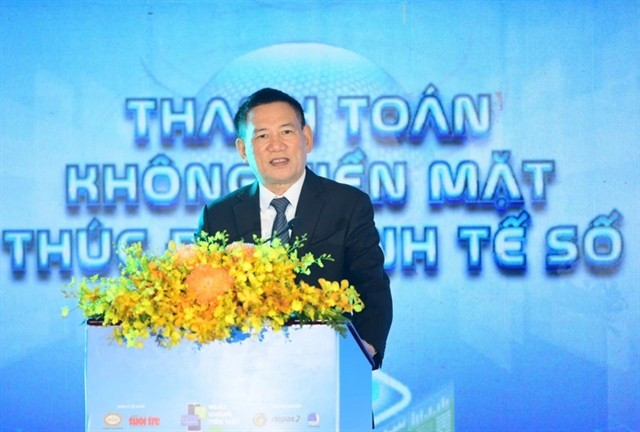
See more
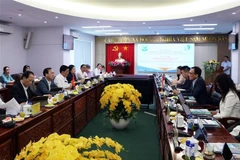
Vinh Long, Singaporean company eye cooperation in renewable energy, eco-industrial parks
Lawrence Chan, Head of Vietnam–Singapore Industrial Park (VSIP) in Vietnam, said Sembcorp is a global group that focuses on energy and urban development, with a mission to promote a sustainable and responsible energy transition.

“Vietnam Wood” certification mark launched as symbol of validation
The “Vietnam Wood” mark represents a strong commitment to legally sourced timber, high quality, and environmental and social responsibility, serving as a legal safeguard for Vietnamese products and enhancing business competitiveness.

MoIT to roll out product traceability system on December 23
Built with a people- and business-centred approach, the system is designed to serve as a bridge between enterprises and consumers, helping strengthen market confidence.
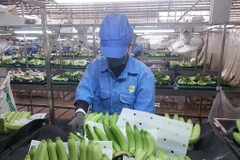
Agro-forestry-fishery exports poised to hit record high in 2025
Agro-forestry-aquatic exports totalled 64.01 billion USD in the first 11 months of 2025. If performance in the final month matches that of recent months, the figure could approach 70 billion USD, far exceeding the 65-billion-USD target set for the year.

Vietnam’s textile-garment industry under pressure for deeper restructuring
To achieve the industry's targets, enterprises must accelerate market, product, and customer diversification while boosting investment attraction to the supply segments Vietnam still faces shortages in, and developing human resources in parallel with science and technology promotion.
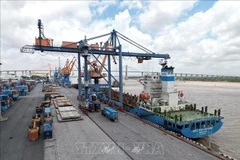
Circular on domestic maritime transport permits for foreign vessels issued
Under the circular, which will take effect from February 1 next year, the Minister of Construction will grant the permits for cases such as transporting oversized or overweight cargo or other types of goods using specialised vessels; clearing congested cargo, passengers, and luggage at ports when Vietnamese ships are unable to handle them; and conducting disaster relief, disease control, or emergency humanitarian aid.

International Financial Centre in HCM City hoped to become new growth engine
The International Financial Centre in Ho Chi Minh City is expected to become a new growth driver while enhancing Vietnam’s and HCM City’s position on the global financial map.
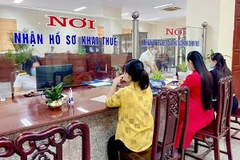
Decree regulates corporate income tax incentives
A CIT rate of 15% applies to enterprises with a total revenue in the preceding year of not more than 3 billion VND (114,000 USD), while a CIT rate of 17% applies to enterprises with a total revenue in the preceding year of over 3 billion VND but not more than 50 billion VND.

FAO Representative hails Vietnam’s progress in sustainable agriculture
Mr. Vinod Ahuja, Food and Agriculture Organization of the United Nations (FAO) Representative for Vietnam hails Vietnam’s progress in sustainable agriculture, particularly low-emission rice, in an exclusive interview with the Vietnam News Agency as 2025 wraps up.

GOE Alliance commits to partnering with HCM City IFC
The GOE Alliance was officially launched at the Autumn Economic Forum in November 2025, bringing together technology firms, financial institutions, policy experts and international partners, including Viettel Digital Services, Dragon Capital, Tether, Ava Labs, Sky Mavis, Republic and Onchain Academy. The alliance aims to pilot on-chain economic models within a policy-oriented legal framework.

Vietnam joins elite group of 15 largest trading countries
The country recorded its first trade surplus in 2012 and has maintained a continuous streak of surplus for 10 years since 2016. The surplus grew steadily, hitting 19.9 billion USD in 2020, a record of 28.3 billion USD in 2023, and 24.9 billion USD in 2024.
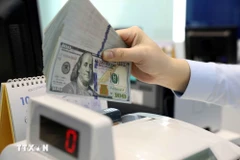
Reference exchange up slightly at week’s beginning
With the current trading band of +/- 5%, the ceiling rate applicable for commercial banks during the day is 26,406 VND/USD, and the floor rate 23,892 VND/USD.
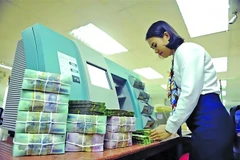
State budget revenue hits 94 billion USD by mid-December
The structure of the revenue continues to shift towards sustainability, with the production and business sector playing a leading role.

Official describes VIFTA as new driving force for Vietnam – Israel trade
The substantive tariff preferences under VIFTA have quickly encouraged businesses from both countries to expand transactions, which have been translated directly into tangible trade growth.

Vietnam OCOP Festival 2025 opens in Hanoi
The festival functions as a space to bring together regional OCOP excellence, a forum connecting OCOP stakeholders with distributors, investors, experts and consumers, and a platform to spread pride in indigenous culture, local knowledge, and the aspiration for legitimate prosperity.
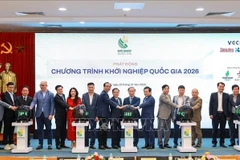
Top projects honoured at Startup Festival 2025 finals
The Startup Festival 2025 marked the largest annual event summarising a year-long startup support programme.

Modern, comprehensive infrastructure – a need for fast, sustainable development: PM
The Party and State continue to define infrastructure development as one of the three strategic breakthroughs, with priority given to building comprehensive and modern infrastructure, particularly transport facilities, technological infrastructure, and green – digital transition infrastructure, to help realise the national target of double-digit growth, the PM said.
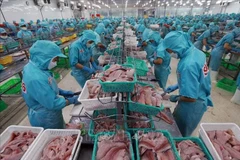
Mercosur, Vietnam launch preferential trade agreement negotiations
The parties are finalising terms of reference that will define the scope, structure, and methodology for talks, according to a statement posted on the Brazilian government's website.

Green transition emerges as new engine of growth
Green growth and sustainable development are not an easy path, but they promise many “sweet fruits” commensurate with businesses’ efforts.
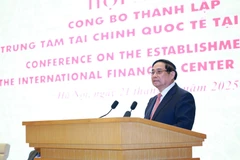
Vietnam’s International Financial Centre officially comes into being
The IFC establishment is an urgent requirement in reality and based on Vietnam’s potential, advantages, and epochal vision for fast and sustainable development.
